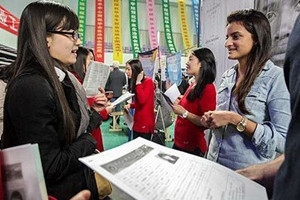
How do you secure a job in a competitive market? Some students are no longer satisfied with sending out their resumes online and waiting for a response. They’re so fed up of looking for a job that they visit HRs in their office, even if their application has already been turned down.
如何在競(jìng)爭(zhēng)激烈的就業(yè)市場(chǎng)中求職成功?一些學(xué)生不再滿足于網(wǎng)投簡(jiǎn)歷然后等待回音這么簡(jiǎn)單了。因?yàn)閰捑肓税床烤桶嗟卣夜ぷ鳎幢闵暾?qǐng)被拒,他們也還是選擇直接去拜訪人事部門。
“Applicants are willing to try new things that might be against the rules but could improve their chances,” said Wang Qiuqiu, 22, a senior majoring in advertisement at Zhejiang University.
浙江大學(xué)廣告專業(yè)的大四學(xué)生、22歲的王秋秋(音譯)表示:“求職者愿意嘗試一些新事物,可能有些不按理出牌,但是卻會(huì)大大增加求職的勝算。”
After Wang saw an interesting job online, she applied, confident that she had the right experience and would be a perfect fit. But when she didn’t receive a reply, she decided to try something else.
王秋秋在網(wǎng)上看到一份感興趣的工作并應(yīng)聘了該職位,本以為有過相關(guān)工作經(jīng)驗(yàn)的自己一定是不二人選。但當(dāng)她沒有等來任何回復(fù)時(shí),她決定另辟蹊徑。
“I will go to the company with my resume and talk to the HR manager directly,” she said.
她說:“我打算帶上簡(jiǎn)歷,去那家公司直接同人事經(jīng)理面談。”
But Wang is not the only graduate who has dared to just “drop in”.
而選擇這樣“直接登門拜訪”用人單位的大學(xué)生并非只有王秋秋一人。
According to a recent report by Renren.com, a social media website, more than 21 percent of graduates have tried to attend written tests without an invitation, 15.6 percent of them succeeded.
據(jù)人人網(wǎng)最近發(fā)布的一份報(bào)告顯示,超過21%的畢業(yè)生選擇不請(qǐng)自來,直接參加筆試,而其中15.6%的人竟然成功了。
Another 20 percent tried to show up at interviews unannounced, 14 percent of them managed to persuade HRs to let them join.
還有20%的人突然現(xiàn)身面試現(xiàn)場(chǎng),其中14%的人能夠成功說服招聘人員,準(zhǔn)許其參加面試。
“It demonstrates the courage and creativity of the post-1990 generation,” said He Mang, deputy professor at the Human Resource Development Institute of Chongqing University.
重慶大學(xué)(微博 招生辦)人力資源開發(fā)與管理研究所的副教授何莽(音譯)認(rèn)為:“這證明了90后畢業(yè)生的勇氣和創(chuàng)意。”
“But in the job market only a few manage to find a job in unexpected ways or by accident. So it won’t suit everybody.”
“但是在就業(yè)市場(chǎng)中,只有少數(shù)人能夠通過這種出人意料的方式來找到工作,這純屬偶然,所以并不適用于所有人。”
Some bold graduates believe they have nothing to lose and everything to gain. But Wang Xicheng, HR director at Ernst & Young, an accounting firm, thinks otherwise.
一些大膽的畢業(yè)生認(rèn)為自己不會(huì)有任何損失,卻會(huì)收獲一切。但是安永會(huì)計(jì)師事務(wù)所的人力資源總監(jiān)汪希澄并不這樣認(rèn)為。
“This method can backfire. If candidates show up with no appointment, it could ruin their chances,” She said.
她說:“這種方法可能會(huì)事與愿違。如果申請(qǐng)人沒有預(yù)約便登門面試,反而會(huì)毀掉他們的機(jī)會(huì)。”
For HR managers, such visits draw attention to applicants in the wrong way.
對(duì)于人事經(jīng)理們而言,如此般不請(qǐng)自來可能會(huì)通過一種錯(cuò)誤方式,來給面試官留下個(gè)壞印象。
Zhou Xiaorong, HR manager at Mindray Medical International Ltd in Shenzhen, believes graduates are getting more and more aggressive.
深圳邁瑞醫(yī)療國(guó)際有限公司的人事經(jīng)理周曉蓉(音譯)認(rèn)為畢業(yè)生正在越來越主動(dòng)。
For her, simply visiting to drop off a resume in a polite way is fine. But it’s unacceptable for candidates to ask for an interview or an office tour.
在她看來,只是有禮貌地上門拜訪并遞交簡(jiǎn)歷就好,但無法接受求職者直接要求面談機(jī)會(huì)或是參觀辦公室。
“Showing up with no appointment is impolite, weird, and often a deal-breaker. You need to be patient,” said Zhou.
“沒有預(yù)約就登門拜訪是古怪無禮的行為,往往很煞風(fēng)景。年輕人需要有耐心。”
“It’s the employers who decide whether they want to see a candidate. It annoys me when people try to circumvent that process.”
“是否接見求職者由雇主來決定,因此有人試圖走捷徑時(shí),我會(huì)很生氣。”












